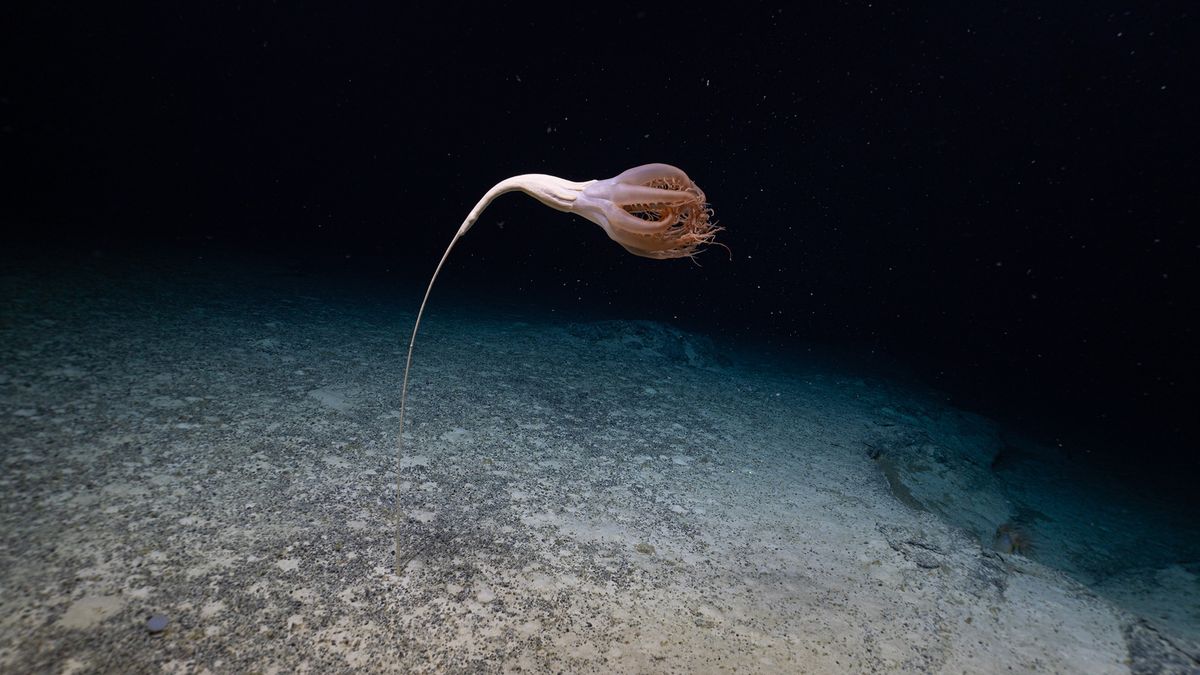Science
Related: About this forumRare and bizarre tentacle-trailing sea creature caught on video, expedition scientist's 'mind is blo
Rare and bizarre tentacle-trailing sea creature caught on video, expedition scientist’s 'mind is blown'
By Jennifer Nalewicki published about 4 hours ago
The 'thrilling discovery' occurred at the bottom of the Pacific Ocean

A sea pen found on the sea floor of the Pacific Ocean could be a new species.
Earlier this month, scientists captured video of a sea pen in the Pacific Ocean. (Image credit: Ocean Exploration Trust, NOAA & Oregon State University/Thurber)
New footage showing a giant, peculiar-looking tentacled sea creature floating languidly in the depths of the Pacific Ocean has left researchers questioning if what they’re seeing is a new species.
A team of scientists spotted the strange animal while on board the E/V Nautilus, a research vessel used by the Ocean Exploration Trust — a nonprofit organization conducting deep-sea research. In a recently released video(opens in new tab), the expedition researchers oohed and aahed as images of the bizarre creature came into focus. "My mind is blown right now," one of the scientists on board can be heard saying off-camera, as the boat’s remotely operated vehicle (ROV) scanned the ocean floor and inched closer to the strange sight. "I’m not on the edge of my seat or nothing," another scientist quipped.
Moments later, the scientists spied another of the oddball creatures nearby, though they were unable to record video of the second individual.
With tentacles extending 16 inches (40 centimeters) from a nearly 7-foot-long (2 meters) stalk, and a single feeding polyp with barbed tentacles cupping the polyp like spiky petals, the creature resembled a very strange, free-swimming flower that was roughly the size of the ROV. It was s~potted July 7 at 9,823 feet (2,994 m) below the surface near a previously unexplored seamount north of Johnston Atoll, an unincorporated U.S. territory and a National Wildlife Refuge in the Pacific Ocean west of Hawaii.
More:
https://www.livescience.com/coral-sea-pen-pacific-ocean
~ ~ ~
VIDEO:
Discovery of a Solumbellula Sea Pen - First Sighting in the Pacific!
At 2994 meters on a never-before-surveyed seamount north of Johnston Atoll, the team made a thrilling discovery — the chance to examine an animal spotted for the very first time in the Pacific Ocean! The sea pen, a colonial cnidarian, had a single large feeding polyp with pinnate (barbed) tentacles stretching over 40 cm from its 2-meter-long stalk.
Solumbellula monocephalus is the only described species in the genus and until this sighting was only known to live in the North and South Atlantic and Indian Oceans. Before this discovery of the colony, the animal had never been seen in the Pacific Ocean. Further review of the footage and this sample will help experts determine if this is the first Pacific S.monocephalus or potentially a new species in this ocean basin.
Enjoy some beautiful close-ups of this coral relative that astounded our team with a detailed view of its stinging feeding tentacles that capture marine snow and food particles drifting by its home on an underwater mountain sedimented saddle. Two individuals were spotted on this dive, confirming a population within the protection of the Johnston Unit of Pacific Remote Islands Marine National Monument. This huge range expansion of Solumbellula in the Pacific Ocean reminds us how important ocean exploration efforts are to understanding this diversity of our planet!
https://nautiluslive.org/video/2022/07/15/discovery-solumbellula-sea-pen-first-sighting-pacific
SWBTATTReg
(24,504 posts)and you get a snapshot of life onboard the Nautilus. Neat!
Judi Lynn
(162,673 posts)wcmagumba
(3,312 posts)Various zoos and wildlife cameras in Africa and other places, love em...the livestream from the Nautilus is one of my favorites...
MLAA
(18,736 posts)Judi Lynn
(162,673 posts)wcmagumba
(3,312 posts)Fun to watch when they have a URV out underwater...they show the view from the URV and its companion URV that monitors it from a distance and usually the control room, including audio for the URV drivers and the biologists and geologists who describe what's going on and take questions from the web...Cool! ![]()
Judi Lynn
(162,673 posts)MuseRider
(34,424 posts)The videos are incredible and beautiful. Thanks.